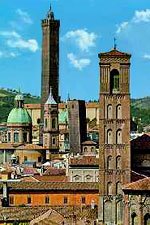Friday, October 06, 2006
 By Way of Introduction
By Way of IntroductionFor two-and-a-half years, from August 2003 to December 2005, I was immersed in what is one of the most important and large-scale experiments in economic democracy in an advanced industrial society.
In the spring of ’03, while working at my current employer the Center for Labor and Community Research, I expressed interest in going back to Italy to go to grad school. Dan Swinney, CLCR’s Executive Director, suggested focusing on Bologna.
Bologna is the capital of Emilia-Romagna, Italy's most prosperous and economically dynamic region. Emilia-Romagna—with it's left governments, vibrant network of small firms cooperating and competing in flexible networks, and perhaps the world's strongest cooperative movement—was an important model of democratic, sustainable development and high performance economics.
Emilia-Romagna, along with Mondragon, Spain, are two international examples that had inspired CLCR’s work and that we needed to gain a deeper understanding of.
In August 2003 I left Chicago for Bologna, armed only with a guide to the history of Emilia-Romagna and two contacts: Francesco Garibaldo of the region's Institute for Labor and Professor Stefano Zamagni, leading academic in the civil economy and director of the University of Bologna Master's Degree in Cooperative Economics.
I spent my first year working as a researcher at the Institute for Labour, doing work mostly in the private sector, studying flexible networks of small and medium enterprises.
The Institute for Labour is a research institute, founded and partly funded by the regional administration, that works with business and labor to implement high road, participatory forms of work organization. Working at the Institute for Labor I was able to gain first-hand knowledge of the regional development model through meetings with labor leaders, entrepreneurs and managers, as well as key policy makers.
In September 2004 I enrolled in the Master's Degree in Cooperative Economics, studying the cooperative movement with Italy's top cooperative managers and academics. Essentially a ‘cooperative’ MBA.
Thanks to my experiences at the Institute for Labor and in the Master's program I was able to have an intimate, 'insider's view' of this extremely complex, dynamic and economically vibrant system based largely on worker ownership. Often the cooperatives—as is the case in manufacturing, construction, services, farming and retail—are among the market leaders in Italy, and the largest firms in the region. Many of the region's large manufacturing coops are leaders globally in their field as well.
What I discovered in my two-and-a-half years there—through interviews with top policymakers, labor, business and the cooperative movement—is a world-class model for sustainable development, one that combines the market, participatory planning and economic democracy.
This Blog will be a collection of my thoughts and writing about Emilia-Romagna, as well as up-to-date analysis of changes in the regional economy, in policy and in the cooperative and labor movements. I hope it can become a real resource.
I’m very thankful to my good friend Dan Bianchi who’s in Spain right now studying in that other center of economic democracy and High Road economics, Mondragon. He really pushed me to start this blog and put my thoughts down on paper.
I was also extremely lucky to have benefited from the support of Bob Williams of the VanCity Credit Union in Vancouver. Without their generosity, I would have been giving English lessons and not studying this wonderful region’s economy, politics and society.
Sounds great I look foward to hearing more about your experience there. I think a good place to start might be by providing a reading list for those interested in finding out more about Emilia-Romagna on their own.
<< Home
